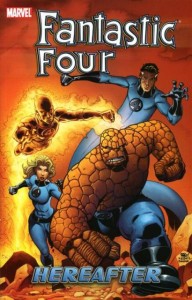Comic books are reliable. Every month readers can expect another installment of their favorite comic on the shelves. Characters facing insurmountable odds will find a way to victory. Nemeses will be defeated. And should a hero die, they are likely to be re-born. In some sense, to be a hero is to be immortal. Even extraordinary humans such as Bruce Wayne (Batman), find their identities preserved for all time by turning the secret hero’s mask into a mantle to be bequeathed on worthy successors. One widespread trope has been much ignored by comic fans and scholars–the journey to the afterlife. Like the katabasis or descent into the Underworld of Orpheus, Odysseus, Gilgamesh, Theseus, and dozens of other mythical figures, modern comic book superheroes routinely journey to heaven, hell, and other landscapes of the afterlife.
A. David Lewis, comic books are presented as an irreplaceable cultural medium for engaging with issues of mortality, identity, subjectivity, and cosmology. In the pages of comic books, Lewis explains, the popular elements of the journey to the afterlife become surfaces upon which can be written a kind of “special reality” whose artificiality makes it possible for readers (and writers) to have discussions about serious issues but never fully commit to the vision of the comic books. For Lewis, that so many different versions of this journey exist but have yet to be readily acknowledged speaks to the major tensions in western culture. One central concern, he maintains, is the unspoken effort to preserve models of self that are unified. “We don’t want see our selves as multiples,” says Lewis. We want to be unified, “whole individuals.” And yet recent work on healthy multiplicity by Helene T. Russell and J. Hills Miller suggests that by accepting “people [as] constructed by many selves” we can further the work of religious pluralism and enhance inter-religious and inter-cultural dialogue.
Podcast: Play in new window | Download | Embed
Subscribe: RSS
 For those who may still see comic books as unworthy material for serious scholarship, A. David Lewis’ recent work (2014’s American Comics, Literary Theory and Religion: The Superhero Afterlife or his 2010 co-edited collection Graven Images) should be a warning to re-think your position. With an overwhelming slate of comic book driven television series (Walking Dead, Gotham, Flash, Green Arrow) and a rising tide of superhero films and franchises (X-Men, Fantastic Four, and the Avengers), there has never been a more essential time to recognize the cultural merits of comic books and seek out their academic rewards.
For those who may still see comic books as unworthy material for serious scholarship, A. David Lewis’ recent work (2014’s American Comics, Literary Theory and Religion: The Superhero Afterlife or his 2010 co-edited collection Graven Images) should be a warning to re-think your position. With an overwhelming slate of comic book driven television series (Walking Dead, Gotham, Flash, Green Arrow) and a rising tide of superhero films and franchises (X-Men, Fantastic Four, and the Avengers), there has never been a more essential time to recognize the cultural merits of comic books and seek out their academic rewards.
Listeners might also be interested in our previous interview with A. David Lewis on “Religion and Comic Books“, and also recent interviews with Carole Cusack on “Religion and Cultural Production” and Alana Vincent on “Religion and Literature“. You can also download this interview, and subscribe to receive our weekly podcast, on iTunes. If you enjoyed it, please take a moment to rate us. And remember, you can use our Amazon.co.uk, Amazon.com, orAmazon.ca links to support us at no additional cost buying comic books, pizza cutters, incense sticks and other cultural products.









